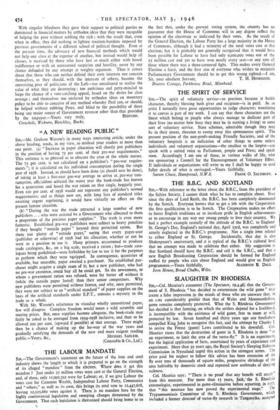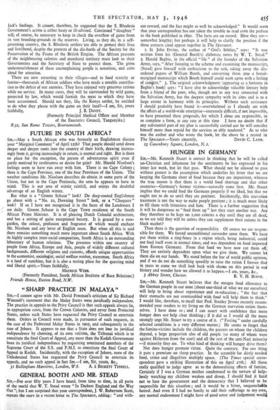SLAUGHTER IN RHODESIA
SIR,—Col. Maurice's statement (The Spectator, 19.4.46) that the Govern- ment of S. Rhodesia " has decided to exterminate the wild game " may create a false impression in the minds of those who are unaware that, in an e:ea considerably grittier than that of Wales and Monmouthshire, game remains completely protected. What the S. Rhodesia Government has decided is that farming, on which the settlers depend for a livelihood, is incompatible with the existence of wild game, free to roam at will, protected by law. Seven hundred and thirty years ago our forefathers compelled King John to recognise this fact, and the attempt by Charles I. to revive the Forest (gains) Laws contributed to his downfall. Col. Maurice states that the destruction of game in S. Rhodesia is done " as an experiment, to limit the area of the tsetse-fly." It is no experiment, but the logical application of facts, ascertained by years of experience and experiment. More than 3o years ago, the Royal Society's Sleeping Sickness Commission in Nyasaland urged this action in the strongest terms. The price paid for neglect to follow this advice has been extension of the fly over tens of thousands of square miles, progressive shrinkage of the area habitable by domestic stock and repeated new outbreaks of sleeping sickness.
Col. Maurice says: "There is no proof that any benefit will result" from this measure. For more than is years, Jack,' the S. Rhodesia entomologist, experimented in game-elimination before reporting, in 1937, that " this measure has now passed the experimental stage." The Trypanosomiasis Committee of the S. Rhodesia Government, which included a former directo? of tsetse-fly research in Tanganyika, accepted
Jack's findings. It cannot, therefore, be suggested that the S. Rhodesia Government's action is either hasty or ill-advised. Continued " slaughter " will, of course, be necessary to keep in check the overflow of game from its vast breeding-grounds in the reserves. Living, as they do, in a self- governing country, the S. Rhodesia settlers are able to protect their lives and livelihood, despite the protests of the die-hards of the Society for the Preservation of the Fauna of the British Empire. The African peasants of the neighbouring colonies and mandated territory must look to their Governments and the Secretary of State to protect them. The gross undernourishment of these uncomplaining people is notorious, and cries aloud for attention.
There are now returning to their villages—and to food scarcity or famine—thousands of African soldiers who have made a notable contribu- tion to the defeat of our enemies. They have enjoyed very generous rations while on service. In many cases, they will be surrounded by wild game, protected by law, which would furnish the meat to which they have been accustomed. Should not they, like the Kenya settler, be entitled to do what they please with the game on their land?—I am, Sir, yours (Formerly Principal Medical Officer and Member of the Executive Council, Tanganyika.) B.32, San Remo Towers, Bournemouth.































 Previous page
Previous page